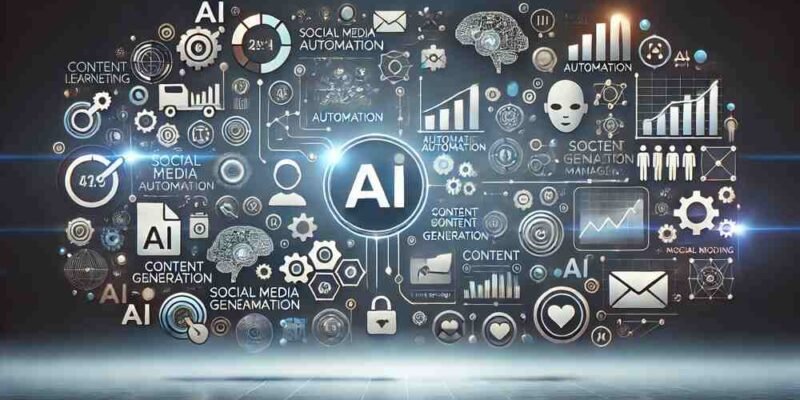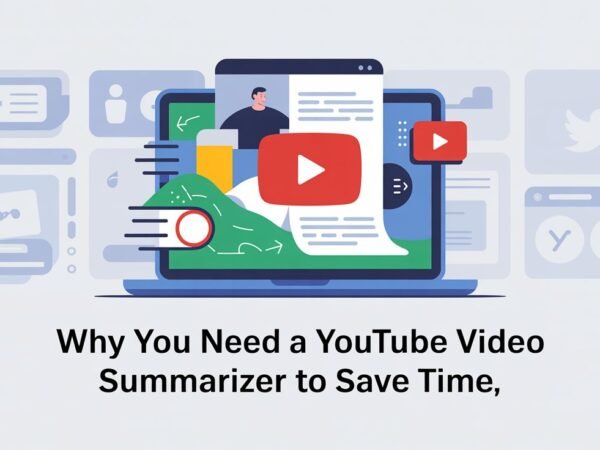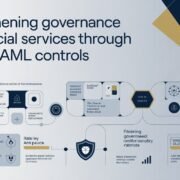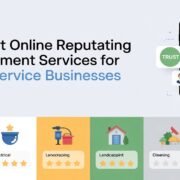Are you using AI marketing tools to their full potential? If not, you’re missing tremendous opportunities. From improving customer experiences to automating time-consuming tasks, AI is shaking up how businesses connect with their audience. Whether you’re trying to increase personalization, analyze customer behavior, or enhance your content strategy, AI tools offer a decisive advantage.
The best part? You don’t need a massive budget or deep technical knowledge to start. Many tools can help you streamline marketing efforts and drive better results. In this guide, we’ll take you on a journey to witness some practical ways to get the most out of AI marketing tools and advance your marketing strategy.
Use Automation for Repetitive Tasks
Marketing involves repetitive tasks that take up too much of your team’s time. These include scheduling emails, posting on social media, and responding to customer inquiries. That’s where automation powered by AI comes in. Leveraging automation tools can save daily hours, allowing your team to focus on more strategic activities like content creation and campaign analysis.
AI tools like Hootsuite or Buffer are perfect for automating social media posts across platforms. You can schedule posts for weeks in advance, track performance, and even get suggestions on the best times to post for optimal engagement. Regarding email marketing, tools like Jasper and Mailchimp handle repetitive tasks, from sending automated replies to setting up email drip campaigns based on customer behavior.
The beauty of using AI for automation is that it doesn’t just stop at saving time. It also helps you make smarter decisions. For example, AI can analyze your campaigns to identify trends or inefficiencies and offer suggestions for improvement. This means you free up your schedule and get actionable insights that help improve overall performance.
Integrating automation into your workflow is a game-changer. It gives you more control over your time, increases productivity, and helps you stay consistent with your marketing efforts—all with minimal effort. If you haven’t already, it’s time to embrace AI-powered automation to keep your business running smoothly.
Maximize Personalization Across Channels
Personalization is now a necessity. Customers expect content, offers, and recommendations tailored specifically to them, and this is where AI marketing tools shine. With AI, you can deliver personalized experiences across multiple channels, such as email, social media, and your website, creating a seamless and consistent customer journey.
AI marketing tools allow you to collect and analyze customer data in real-time. This means you can track their behaviors, preferences, and interactions, enabling you to deliver content that resonates with them. For example, tools like Sprout Social or Brandwatch use AI to help you better understand your audience. They offer insights into customer sentiment and engagement, allowing you to adjust your messaging to match their needs.
But personalization doesn’t stop at just emails or ads. You can use AI to personalize product recommendations on your website, tailor the user experience, and even suggest content based on past interactions. AI tools like Jasper or Albert.ai can help create targeted ad campaigns by analyzing customer data and predicting which content will work best for specific audience segments.
When you maximize personalization, you boost customer loyalty and improve conversion rates. The key is to ensure your messages are relevant to each user at every touchpoint. AI makes this possible, taking the guesswork out of personalization and delivering real-time adjustments that align your marketing efforts with your audience’s evolving preferences.
Using AI marketing tools, you can transform how you connect with your customers, ensuring every interaction is meaningful and tailored to their needs, ultimately driving better results for your business.
Utilize Predictive Analytics for Better Decision Making
Imagine if you could predict your customers’ next move before they make it. AI-powered predictive analytics allows you to do exactly that. These tools analyze vast amounts of customer data to forecast behaviors, trends, and patterns, giving users the insights they need to make smarter, more informed decisions.
Predictive analytics helps target the right audience and optimize your marketing spend. Tools like Albert.ai and Google Analytics 360 use AI to analyze customer data, allowing you to identify high-potential leads and segment audiences based on predicted actions. This means you can focus your resources where they’ll have the most impact, ensuring your efforts drive results rather than being wasted on ineffective strategies.
Additionally, predictive analytics tools can help you understand what types of content or offers will likely resonate with different segments of your audience. By using data-driven insights, you can tailor campaigns more effectively and improve conversion rates. For example, Jasper AI can assist in creating personalized content, while AI-driven platforms like HubSpot can predict the best time to engage with customers based on past interactions.
Predictive analytics doesn’t just stop at forecasting customer behavior—it also helps identify trends that will shape the future of your market. By staying ahead of these trends, you can adapt your strategies proactively, giving you a competitive edge. Whether planning your next campaign or looking for ways to improve current performance, predictive analytics can be the game-changer driving better decision-making in your marketing efforts.
By integrating predictive analytics into your strategy, you’ll streamline your decision-making process and increase your chances of delivering content that truly resonates with your audience. This means less guesswork and more certainty when planning and executing your marketing campaigns.
Adopt AI Tools for Content Creation and Optimization
Creating high-quality content that engages your audience is crucial for any marketing strategy. However, coming up with fresh ideas or optimizing existing content for SEO can be time-consuming and often overwhelming. That’s where AI tools for content creation and optimization come into play, making the process faster and more efficient.
AI-powered platforms like Jasper or ChatGPT allow you to generate well-written articles, product descriptions, social media posts, and more with just a few prompts. Whether you need blog post ideas, catchy headlines, or full-length articles, these tools can speed up your workflow by producing quality content in minutes.
They can even help brainstorm ideas when you’re stuck, ensuring your content remains fresh and relevant. Regarding content optimization, AI tools like Hemingway Editor and Grammarly are perfect for refining your writing. These platforms analyze your content for readability, clarity, and grammar, helping you deliver polished, easy-to-understand content.
AI tools such as Surfer SEO can optimize your content for search engines by suggesting the right keywords, headings, and structure to boost your Google ranking. Optimizing your content is primarily about ensuring your writing is engaging and meets the needs of your audience.
AI tools can help identify gaps in your content, suggest relevant topics, or improve the tone to resonate with readers. This ensures that your content ranks well and provides value to your audience. By adopting AI tools for content creation and optimization, you can streamline your content production process, maintain quality, and improve SEO performance, all while saving valuable time. These tools are indispensable for marketers looking to create impactful content at scale without sacrificing creativity or effectiveness.
Improve SEO and Market Research with AI
Leveraging AI for SEO and market research is necessary if your website ranks higher on search engines and reaches the right audience. Traditional SEO tactics are still effective, but AI can elevate your strategy by providing insights and automating tasks that would otherwise take hours. AI-powered SEO tools, like Surfer SEO and Semrush, analyze large amounts of data in real time. They can suggest the most relevant keywords, track competitors, and even help you structure your content for better rankings.
For instance, these tools can show you which search terms your target audience uses, helping you create more relevant content that satisfies their search intent. They also provide recommendations for on-page optimization, such as where to place keywords, the length of your content, and which headings to use. Regarding market research, AI tools like AnswerThePublic and BuzzSumo help you uncover trending topics and questions your audience is asking. These insights are invaluable for identifying new content opportunities and staying ahead of competitors.
By understanding what your audience is searching for, you can create highly targeted content that addresses their needs, driving more organic traffic to your site. AI also helps with technical SEO by monitoring website performance, analyzing backlinks, and identifying potential errors that could affect your rankings. Tools like Screaming Frog can automatically crawl your website and detect broken links, slow-loading pages, or duplicate content that may hurt your SEO.
By using AI to improve your SEO and market research efforts, you’re optimizing for search engines and delivering better content to your audience. It’s a win-win: more traffic, engagement, and, ultimately, better results for your business.
Embrace AI for Social Media Management
Managing multiple social media platforms can be overwhelming, but AI can simplify and help you achieve better results. AI tools for social media management, such as Hootsuite and Buffer, allow you to schedule posts, track engagement, and even get suggestions on the best times to post. These tools save you time by automating repetitive tasks, freeing you up to focus on creating quality content and engaging with your audience.
AI doesn’t just automate posting. It helps you analyze data and make better decisions. Tools like Sprout Social, for example, provide detailed analytics on audience demographics, engagement rates, and trending content. This data can guide your content strategy, helping you create posts that resonate with your audience and increase engagement.
AI also assists with social listening, a crucial aspect of modern marketing. Platforms like Brandwatch and BuzzSumo use AI to track conversations about your brand, products, or industry across social media channels. This real-time feedback lets you adjust your campaigns quickly and respond to customer needs more effectively.
By embracing AI in social media management, you can stay ahead of trends, improve the effectiveness of your content, and make data-driven decisions that boost your social media presence without the stress of manual management.
Conclusion
AI marketing tools are transforming businesses’ operations, making automating tasks, personalizing content, and optimizing campaigns easier. Whether leveraging AI for automation, personalization, predictive analytics, content creation, SEO, or social media management, the key is to integrate these tools into your existing strategies.
AI empowers you to make smarter, faster decisions while saving time and resources. Incorporating these tools into your marketing efforts can enhance efficiency, drive better results, and stay competitive in a fast-evolving digital landscape. The future of marketing is AI-driven, and the sooner you embrace it, the sooner you’ll see the benefits in your business.
Do Read: ChartContacts.shop: The Comprehensive Contact Management Solution to Streamline Your Business













